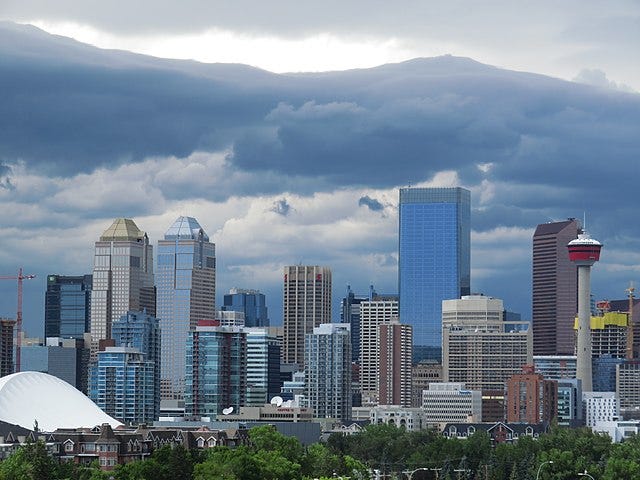What is to be done about Calgary's downtown vacancies?
With almost one-third of office space downtown empty, the city is doing what it does best — subsidizing developers
Anyone who lives in Calgary knows the city has faced a downtown office vacancy crisis since oil prices crashed six years ago, with about one-third of office space in the heart of the city sitting empty.
This isn’t just about empty office towers — the property taxes the city foregoes from the vacancies necessitate service cuts or tax increases elsewhere, as well as gentrification in historic neighbourhoods like Inglewood to rebuild the property tax base.

As a result of the downturn in the oil sector, council voted in 2019 to shift the tax burden away from struggling businesses and onto struggling homeowners.
There are 10 buildings downtown with at least 75% vacancy, with three of them entirely empty, the CBC reports.
Jonny Hehr of Gibbs Gates Architects is looking to repurpose one of these buildings as affordable housing, which he says in addition to putting an empty building to use can serve to bring vibrancy to downtown Calgary.
"We really have to rethink how we leverage the buildings and the infrastructure that we already have and turn it into the metropolitan city that Calgary always wants to be. To do that we have to have life in our downtown core after 5 o'clock," he said. "The adversity of it breeds creativity and if you don't have that problem then you don't have the creativity to solve it."
But first, you have to give him money.
Indeed, city council has set aside $45 million to subsidize the cost of turning downtown office buildings into residential towers, which in effect is a subsidy to developers who are unwilling to assume the risk on their own.
Another option is a bit bonkers — turning these buildings into vertical greenhouses that can grow produce year-round, a proposal endorsed by Ward 8 council candidate Gary Bobrovitz. (Remember him?)
But according to Tom Mahler, the head of the city’s downtown strategy, this would also require heavy subsidies from the city.
Rather than throwing corporate subsidies at developers, perhaps the city should look towards taking advantage of dirt cheap downtown property values and build its own social housing that is wholly insulated from the market’s whims.
To achieve this, we need to reconceptualize how we build cities, moving away from creating places for profit, where citizens are lucky to “live, work and play” if they can afford rent, and towards building spaces that put people first.
In other news …
Alberta Teacher’s Association launches ad campaign against UCP education policy
The Alberta Teachers Association (ATA), which represents teachers in the province’s public, separate and francophone school boards, is launching a $1 million ad campaign against the provincial government’s “reckless changes” to the education system, including sprawling class sizes and a widely-panned K-6 curriculum update.
The campaign is being done in partnership with the Alberta School Councils’ Association and will consist of radio, print and online advertising, as well as a tersely-worded open letter to Premier Jason Kenney and Education Minister Adriana Lagrange.
If this is anything like the ATA’s past interventions, don’t expect it to amount to much.
Outgoing Calgary and Edmonton mayors detail struggles working with UCP government
In a joint interview with the CBC’s West of Centre podcast, outgoing Calgary Mayor Naheed Nenshi and Edmonton Mayor Don Iveson reflected on their tense relationships with Alberta’s provincial UCP government, particularly as it pertains to handling COVID’s fourth wave.
Iveson said he hasn’t been in communication with Premier Jason Kenney since August.
Nenshi revealed that the provincial government pushed for the Calgary Stampede to return this year, not the Stampede board, who had reservations about putting on the festivities safely during COVID.
Booted UCP MLA Drew Barnes suggests starting a new rural Alberta-based party
Cypress-Medicine Hat MLA Drew Barnes, who was kicked out of the UCP caucus in May for criticizing Alberta’s notoriously lax COVID measures as being too stringent, is thinking about starting a new party that is focused on “rural values”.
The party would run in the province’s 41 ridings outside of Edmonton and Calgary, with the apparent goal of pressuring the UCP to shift rightward (if such a thing is possible).
Edited by Joel Laforest
If you like this content, feel free to share, subscribe and tell your friends:

